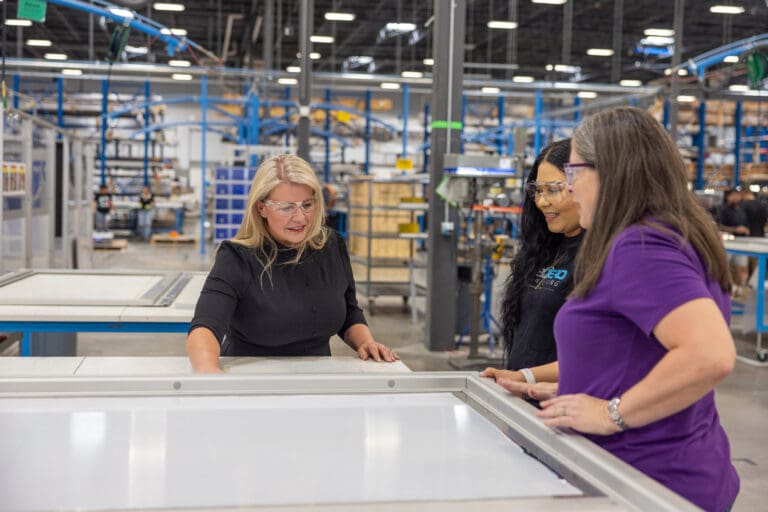We asked experts, recently named as some of the industry’s ‘Most Inspiring Women in Cyber’, from across the cybersecurity industry what needs to happen to stop DEI initiatives from regressing globally.
Michelle Corrigan, Director at Digital Care Hub
“DEI isn’t a one-time initiative—it’s a long-term commitment that requires action, accountability, and constant momentum.
To ensure Diversity, Equity, and Inclusion (DEI) initiatives keep progressing rather than regressing, we need to move beyond one-off programs and performative gestures and embed DEI into the core of company culture, policies, and leadership decisions.
DEI isn’t a checkbox—it’s a continuous, evolving effort.
Progress happens when we refuse to accept setbacks as the norm and instead, keep pushing for workplaces where everyone—regardless of gender, background, or technical expertise—has an equal chance to succeed.”
Lisa Landau, CEO and Co-Founder of ThreatLight
“For DEI initiatives to progress, it takes more than just policies – it requires a mindset shift. Organisations need to ensure accountability at the leadership level, invest in mentorship and development programs, and practice what they preach throughout the company and year, not only on special occasions.
It’s about creating an environment where fairness is built into the system, not something that needs constant correction. Transparency, ongoing education, and a commitment to meaningful change beyond just checking boxes are essential.”
Eva Benn, Chief of Staff, Strategy – Microsoft Red Team
“DEI progress only lasts if we stop treating it like a side project and start living it as a core part of how we lead, hire, promote, and build. It’s not enough to open the door for diverse talent—we have to create environments where they are valued, heard, and given real opportunities to grow and lead.
That means amplifying underrepresented voices, actively sponsoring others, and making space at tables where decisions are made. It means calling out bias, even when it’s uncomfortable. And it means remembering that representation isn’t just about today—it’s about the future.
The moment we stop fighting for it, we lose it. So the real question is: What will you do today to keep pushing this forward? Because lasting change doesn’t come from one person or one initiative. It comes from all of us, choosing—over and over again—to build a world where everyone belongs.”
Katie Beecroft, Associate Director Risk & Security, Fidelity International
“We need to ensure that cybersecurity is accessible to everyone. Often, people think it’s a highly technical space, which is not helped by the industry’s use of jargon, complicated terminology, and acronyms. While there are some technical highly specialised roles, there are also many different career paths in cyber that require common skill sets most people possess, such as strong communication, problem-solving, and the ability to guide and influence.“
Anastasiia Ostrovska, co-founder & CEO, Women’s Leadership and Strategic Initiatives Foundation (WLSIF)
“In my opinion, the key is shifting the focus from simply achieving gender balance toward truly empowering women’s leadership. The more women we have leading companies or holding senior positions at various levels, the easier it will become for others to advance in their careers, as seeing women in leadership roles becomes the new norm for everyone around us.”
Sochima Okoye, Cybersecurity Consultant at CSA Cyber
“I think the key here is for businesses to be open minded and to champion a culture that values allyship. Businesses with successful DEI initiatives have togetherness ingrained in their core.
It is not a tick box or buzz word or a way to boost profits, it’s just who they are.
I believe this starts from the top. If your board members and C-suite do not understand what DEI initiatives do for others, then it will not be a priority to them. So, as difficult as it sounds, I would start there. Ask the senior leadership to prioritise inclusivity and help them understand the experiences of under-represented groups- this can be employees within the company, or externally, through the customers or audiences that their business reaches.”
Jess Matthews, Compliance Governance Officer at Acacium Group
“If history has taught us anything it is that there is no guarantee progress will be linear. There are times where we regress before we can progress further. What is vital to remember is that we should not take anything for granted and this applies no less for DEI initiatives.
It is 2025 and on the face of it, the political backdrop could not be bleaker. However, there is a risk that apathy or hopelessness kicks in and we find ourselves in a position that is untenable, where DEI initiatives are rolled back and strides that have been made, all amount to nothing.
It is why there is a moral imperative that “we all be the example of what we want to see.” What does this mean in practice? Be visible. If my time in the cyber security industry has taught me anything and my involvement in the political world before that: never underestimate the power of community.
Be the example.
It can start small and your actions can be bottom-up and begin at the grassroots level.
This is where they often begin, and movements start to take root. Take the time to have an open dialogue in your workplace, with your peers, or elsewhere – share and express your concerns in a constructive manner!
In the cyber security industry, there are a plethora of organisations that engage in the DEI space who shine a light on why it matters. If ever there was a time where we should all come together to show strength. The time would be now. We do not need to find our voice. We will not lose our voices. We must stand firm and redouble our efforts to ensure that DEI initiatives continue to progress. We owe it to ourselves and generations to come.”
Helen Oluyemi, Information Security Manager at Pollinate International Limited
“Support from leadership teams in every organisation is key. Not just through written policies or words, but through visible, actionable support. Leadership must demonstrate their commitment to DEI by embedding it into every aspect of the company, from the hiring process to promotions and opportunities. This means creating tangible pathways for underrepresented groups to move into leadership roles, ensuring they have the tools, resources, and mentorship to succeed. Leadership must actively encourage diversity at every level and work to eliminate any barriers that prevent marginalized groups from advancing. When support is visible and consistent, it reinforces the organization’s commitment to DEI and fosters a culture where everyone has the opportunity to thrive.
Caroline Kamper, Strategic Cyber Threat Intelligence Analyst at SecAlliance
“DEI should be recognised as a strategic priority—not just a regulatory necessity, but a key driver of innovation and success. For real impact, leadership should actively support DEI, taking implementation and guidelines seriously rather than treating them as an afterthought. Hiring and promotion should reflect a commitment to diversity at all levels, ensuring inclusive representation in both teams and leadership. Beyond recruitment, DEI should be embedded in daily operations— from company communication to task distribution — creating a workplace where everyone feels valued and empowered. By prioritising DEI in every aspect of the workplace, organisations not only create a more welcoming and supportive environment but also drive better business outcomes through diverse perspectives, greater creativity, and enhanced problem-solving.”
Marine Ruhamanya, Cybersecurity Senior Manager at Accenture
“To ensure DEI continues progressing despite growing backlash, we must reframe the conversation and evolve the approach. DEI is increasingly labelled by critics as discriminatory and divisive. To counter this, we need to shift from performative diversity efforts to building cultures that prioritise cognitive diversity, fairness, and meritocracy in a way that benefits everyone.
This means creating workplace environments where:
- Cognitive Diversity – People with different ways of thinking, problem-solving, and approaching challenges are valued and included, not just those who fit traditional molds. This leads to more innovation and better decision-making.
- Fairness – Systems are designed to ensure equal access to opportunities, so success isn’t determined by background, connections, or unconscious biases, but by actual skills and contributions.
- Meritocracy That Works for Everyone – True meritocracy isn’t about ignoring bias but actively removing barriers that prevent talented people from advancing. It ensures the best ideas and individuals rise based on ability, not because they have an easier path to success.
When done right, this benefits everyone, not just underrepresented groups.
It creates stronger teams, better business outcomes, and a more dynamic, future-ready workforce.
The future belongs to organisations that can navigate complexity and disruption—something only possible when diverse lived experiences challenge groupthink and drive better solutions. DEI isn’t about exclusion; it’s about expanding opportunity, ensuring fair access to leadership, and making businesses more adaptable and competitive in a rapidly changing world.”







